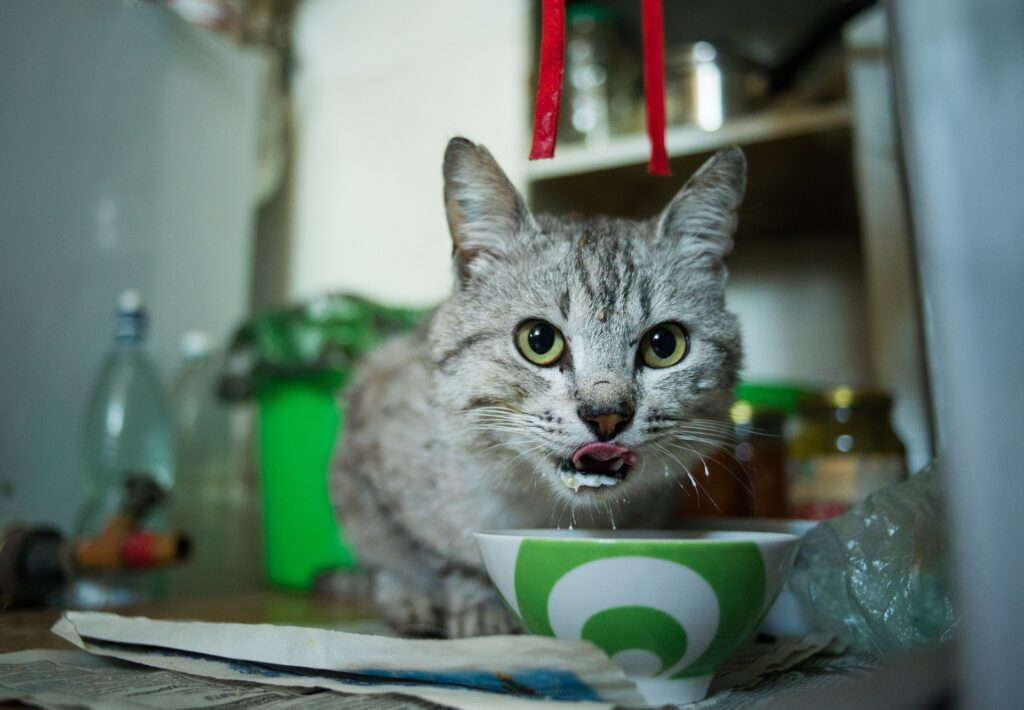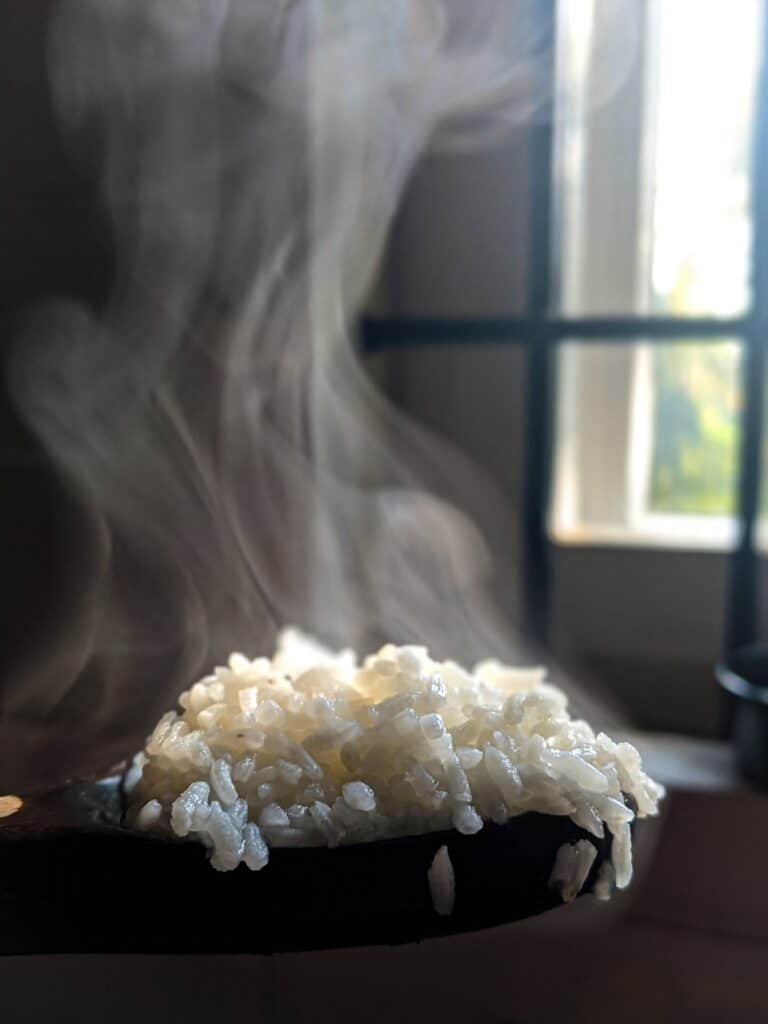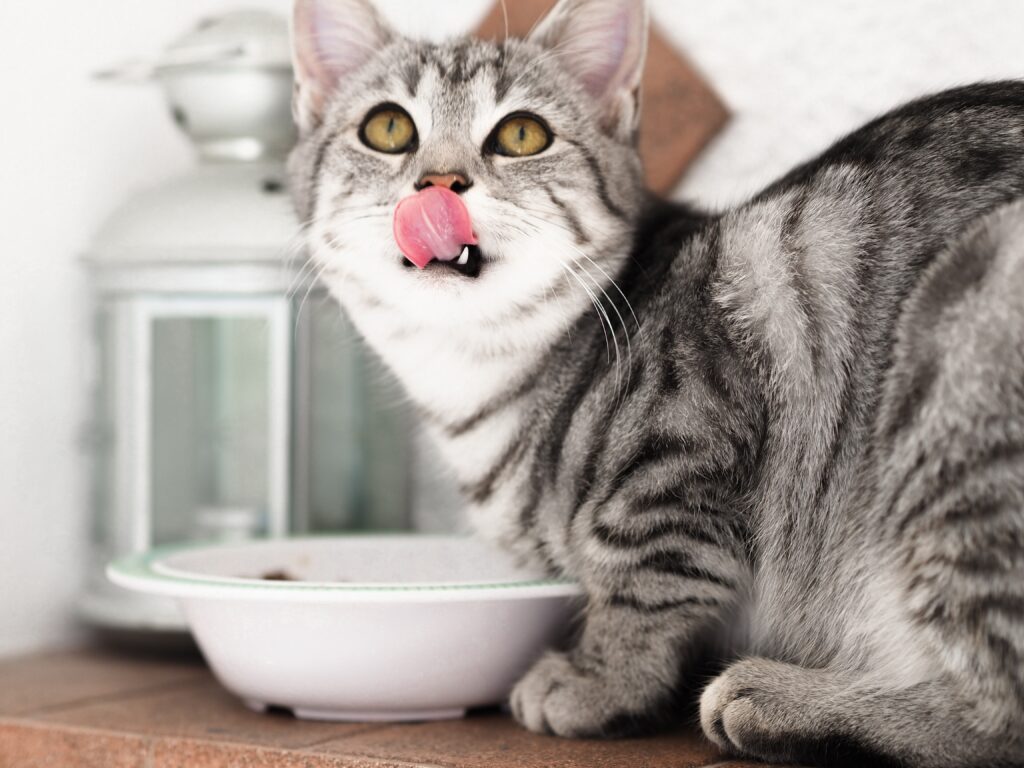Many people wonder if cats can eat rice, especially if they have stomach issues or if their usual food has run out and there is no time to go out and buy more. True, some human foods can be consumed by cats, but is rice one of them?

Rice is a common ingredient in our human diet; in fact, it is near the bottom of our food pyramid. Is rice, on the other hand, good or bad for cats? Rice is not toxic to cats, despite the fact that it is not a recommended food.
Table of Contents
So can cats eat rice? Yes, but in a limited way.
Cats are carnivorous animals, so protein and fat are essential components of their diet. In fact, if we do not consider this critical information when evaluating the cat’s diet, we are very likely to produce nutritional deficiencies in the long run.
Rice, which is mostly carbohydrates, is a food that does not meet the nutritional needs of cats. As a result, a cat should not be fed rice on a regular basis. Gluten can also cause intolerance and allergic reactions in cats.
However, on rare occasions, it may be prudent to feed rice to our felines, particularly when dealing with gastrointestinal diseases such as diarrhea in cats. In these cases, the dry feed may irritate our feline’s stomach. Rice, on the other hand, will help regulate your gut, so it can be given to cats with diarrhea for 3-4 days as part of a bland diet.
Once the cat has recovered, we must gradually return to its normal diet, as continued consumption of rice can cause a variety of health issues, including constipation and gas.
Can small cats eat rice?

Small cats should avoid eating rice, even if they have diarrhea because it can harm their development and cause constipation. In these cases, it is best to visit the vet and purchase a puppy cat’s gastrointestinal feed.
Rice properties and benefits for cats
Although rice does not provide cats with the components their bodies require, it does provide them with certain benefits; thus, we explain what the properties of rice for cats are:
- It is rich in calories and carbohydrates
- Contains vitamin B
- Provides magnesium, although in small amounts
- Provides iron
Even so, keep in mind that you should only include it in your diet in moderation if your veterinarian recommends it following a review for a gastrointestinal or similar problem.
How to make rice for cats? Can cats eat cooked rice
Cats can eat rice on occasion, but which type is best for them? What is the proper way to feed rice to a cat? There are many different types of rice on the market, but the most common are white rice and brown rice:
- Can Cats Consume White Rice? Yes, always well cooked, never raw, as raw grain can cause stomach pain. In addition, rice may contain lectin, a pesticide that can cause poisoning and vomiting. Cooked rice, on the other hand, is not harmful and can be administered safely for a few days.
- Can Cats Consume Brown Rice? In this case, the answer is also positive; there are even commercial cat patés made with brown rice and chicken. In the case of brown rice, we will provide additional fiber.
So, when making rice recipes for cats with diarrhea, you may be wondering how to give rice to a cat and what other ingredients you can include in a special diet. Next, we’ll show you how to feed rice to a cat, including some recipes and instructions.
Recipes with rice for cats
Do you want to know how to make cat rice? There are several simple recipes available for cats suffering from diarrhea. They take little time and are likely to be well received by your cat:
Chicken rice
If you’re wondering how to make chicken rice for cats, this is the recipe for you. The chicken rice mix will help your cat’s digestive system regulate itself, while the chicken nutrients will provide it with energy and aid in its recovery from illness.
You will need the following ingredients to make this rice recipe for cats with diarrhea:
- ½ cup of rice
- ½ cup boneless chicken, skinless and fat-free
- ¼ carrot
Boil the chicken in water with no salt, onion, or seasonings added. While the carrot is cooking, cut it into small cubes. Then, take the chicken out of the water (but keep the broth) and shred it. Cook the rice with the chicken pieces and carrot, using the reserved broth instead of water to make it more appetizing.
When the rice is done, allow it to warm up before serving this tasty rice with chicken for cats.
Fish and rice
We can also use chicken instead of fish. Can cats, however, eat rice with tuna? Canned tuna contains mercury, bisphenol, and high levels of sodium and is not recommended. Ideally, you should always choose high-quality fish, whether fresh or frozen.
Although canned tuna is not recommended for cats, you can offer it to yours if you are in a situation where you do not want to eat anything else and need to recover; just make sure it is tuna in water, not tuna in oil.
Combining rice and fish is an appealing option because it provides omega-3 and fatty acids. Keep in mind that the fish must be cooked. Salmon, tuna, sardine, trout, or anchovy can all be used.
Here’s another cat rice recipe, this time with fish. You must do the following:
- 300 grams of fish
- ½ cup of rice
- 1 carrot
The method of preparation is the same as in the recipe for rice with chicken for cats. Cook the fish in water with no seasonings or additives. Cut the carrot into squares or grate it. Allow the fish to cool before shredding and removing the bones. Cook the rice with the carrot and shredded fish in the same water that you cooked the fish in.
Allow it to warm before serving it to your cat. The preparation can be refrigerated for up to 2 days.
Can cats eat rice and chicken?
Can cats eat chicken and rice? Rice fiber helps to firm the stool, while chicken protein provides energy. More taurine (an amino acid) is found in chicken liver than in chicken breast. Boil the meat, debone it, chop it up, and leave it unseasoned.
Because of the high fiber and protein content, rice and chicken take longer to digest, leaving your cat feeling full. Because most cats will grow bored of the bland taste, this meal should be reserved for gastric episodes.
Can cats eat rice cakes?
Cats can eat rice, so it stands to reason that they can eat rice cakes as well. Rice is, after all, the most abundant ingredient in rice cakes.
However, when feeding rice cakes or other rice-based foods to your feline companion, certain precautions must be taken. This is primarily due to the fact that a cat’s diet does not typically include plant-based foods. High rice consumption could leave your adorable Kitto with serious side effects.
Can cats eat uncooked rice?
Bloating, vomiting, and diarrhea can result from eating raw rice. Rice cooked with oils or seasonings may cause stomach upset or even be toxic. If you suspect your cat has eaten raw or seasoned rice, consult with your veterinarian. Plain, cooked rice is unlikely to cause problems and can help cats with stomach upset.
Can cats eat jasmine rice?
In a nutshell, yes. Jasmine rice, like all rice, is nontoxic to cats and is even recommended by some veterinarians for sick cats who are having difficulty eating. There are, however, some things to consider before allowing your cat to eat any type of rice, including Jasmine.
Can cats eat rice pudding?
Cats can consume rice pudding. Rice is not on the official list of cat-harmful foods, so you don’t have to worry if your cat steals a mouthful from your plate, but it shouldn’t be given on a regular basis.
Can cats eat basmati rice?
These are basmati rice, jasmine rice, and regular long-grain rice.
All of these rice varieties are suitable for your cat’s digestion. If you prepare some well-cooked rice, your cat will happily gobble it up while meowing contentedly.
Can cats eat fried rice?
Cats can eat fried chicken, but only on rare occasions. To make it healthier and safer to eat, remove the skin and bones before giving them to your pet. However, don’t always feed fried chicken to your cat because it can cause stomach upset.
Can cats eat white rice?
Although white rice doesn’t have as much nutritional value as other types of food, cats can still eat it if it is given to them in small amounts with other foods. Limiting your carbohydrate intake is a good idea if you’re trying to lose weight because eating too many of them can make you gain weight.
A low-carbohydrate diet can be used if you want to consume a lot of carbohydrates. This diet, which is high in protein and low in carbohydrates, can help people lose a lot of weight. In our article on the Atkins Diet, you can learn more about this eating plan.
Can cats eat brown rice?
Yes, it is acceptable to occasionally give your cat cooked brown rice as a treat or as an addition to their diet because the nutritious benefits outweigh the drawbacks. A little bit at a time is best because it’s never a good idea to give someone too much of anything. Your cat should be fine as long as you choose the brown rice from their favorite dishes and it is not overcooked.
Is rice good for cats with diarrhea?
Cats may suffer if they eat too much rice. Additionally, rice contains a lot of fiber. If fed in large amounts, it may give your cat diarrhea or constipation. Uncooked rice is difficult to digest and can cause stomach pain, bloating gas, and diarrhea in cats, so they should never eat it. Additionally high in sodium is rice, which can cause heart disease and high blood pressure in cats, particularly if they are fed a diet high in sodium. It is advised that cats be given a minimum of 1 cup of cooked rice per meal, or at least 2 cups of rice per day.
Can cats eat eggs
Eggs can be consumed by cats. Cats can get a lot of calories from eggs. In addition to being a great source of vitamins and minerals, eggs are also very simple to digest. The best way to ensure that your cat’s diet is as nutrient-dense as possible is to cook eggs in a variety of ways, including scrambled and boiled.
Additionally, eggs are a good source of riboflavin, pantothenic acid, thiamine, niacin, pyridoxine, calcium, magnesium, iron, zinc, and vitamin B12. Beta-carotene, vitamin A, vitamin E, folate, copper, manganese, selenium, potassium, sodium, and zinc are all abundant in egg yolks. Additionally, they include a number of minerals like calcium carbonate and magnesium stearate.
Bibliography
- Nutritional guides for complete foods and supplements for dogs and cats – European Federation of Pet Food Manufacturers (FEDIAF)
- Allaboutcats
- Vet.Cornell
- aafco.org
Related Posts
